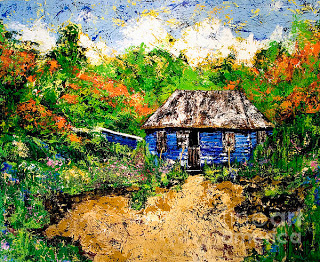Jesus presented another parable to the crowds: “The kindom of heaven is like the mustard seed which a farmer sowed in a field. It is the smallest of all seeds, but when it grows it is the biggest shrub of all – it becomes a tree so that the birds of the air come to perch in its branches.”
Jesus offered them still another parable: “The kindom of heaven is like the yeast a baker took and mixed in with three measures of flour until it was leavened all through.”
Mathew 13: 31-33 (Mark 4:30-32, Luke 13:18-21)

Humble Beginnings by Nickola McCoy-Snell
@ http://fineartamerica.com/featured/humble-beginnings-nickola-mccoy-snell.html
It is almost cliché to note that these two parables are about “humble beginnings.” It is cliché until we take a look at what “humble” refers to: insignificant and rag-tag. That is, out of dismissible events and people grow God’s great Empire.
For example, few observers would have suspected that a hole-in-the-wall tranny-bar would become the match to light the modern Gay Rights Movement in the United States. Yet the name Stonewall is now known the world over. In its wake queer sexuality is seen less and less as a predilection and more and more as a life-affirming path.
McCoy-Snell’s painting reminds us that the greatness of a person or even a movement is often masked by the circumstances of their conception and birth.
-continue reading at The Bible In Drag – Queering Scripture


